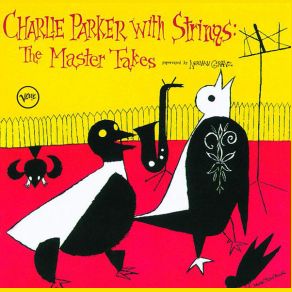Charlie Parker With Strings: The Master Takes
Download links and information about Charlie Parker With Strings: The Master Takes by Charlie Parker. This album was released in 1995 and it belongs to Jazz, Bop genres. It contains 24 tracks with total duration of 01:14:59 minutes.

|
|
|---|---|
| Artist: | Charlie Parker |
| Release date: | 1995 |
| Genre: | Jazz, Bop |
| Tracks: | 24 |
| Duration: | 01:14:59 |
| Buy it NOW at: | |
| Buy on iTunes $11.99 | |
| Buy on Songswave €2.14 | |
Tracks
[Edit]| No. | Title | Length |
|---|---|---|
| 1. | Just Friends | 3:30 |
| 2. | Everything Happens to Me | 3:14 |
| 3. | April In Paris | 3:06 |
| 4. | Summertime | 2:46 |
| 5. | I Didn't Know What Time It Was | 3:12 |
| 6. | If I Should Lose You | 2:46 |
| 7. | Dancing In the Dark | 3:09 |
| 8. | Out of Nowhere | 3:06 |
| 9. | Laura | 2:57 |
| 10. | East of the Sun (West of the Moon) | 3:37 |
| 11. | They Can't Take That Away from Me | 3:16 |
| 12. | Easy to Love | 3:29 |
| 13. | I'm In the Mood for Love (Take 2) | 3:33 |
| 14. | I'll Remember April (Take 3) | 3:01 |
| 15. | What Is This Thing Called Love? (Live Carnegie Hall) | 2:54 |
| 16. | April In Paris (Live Carnegie Hall) | 3:13 |
| 17. | Repetition (Live Carnegie Hall 1950) | 2:48 |
| 18. | Easy to Love (Live Carnegie Hall) | 2:24 |
| 19. | Rocker (I'll Remember April) [Live Carnegie Hall] | 3:00 |
| 20. | Temptation | 3:31 |
| 21. | Lover | 3:06 |
| 22. | Autumn In New York | 3:29 |
| 23. | Stella By Starlight | 2:56 |
| 24. | Repetition (Live Carnegie Hall 1947) (featuring Neal Hefti Orchestra) | 2:56 |
Details
[Edit]It'd be natural to assume that it was producer Norman Granz's idea to put bebop's foremost improviser in front of a string ensemble, perhaps as a stab at commercial success. But by most accounts, this was Bird's brainchild, an idea he'd wanted to pursue for years; it was a chance for him to show his versatility as a musician and pay his respects to the classical world that he so admired. Parker's first session with strings (most likely the first ever by a full-time jazz musician) was November 30, 1949, and it yielded six standards, which were collected in a set of three 78s. Though controversial at the time - and still so today - Charlie Parker with Strings proved to be a huge success. "Just Friends" became Parker's biggest single and immediately showed the potential of the format: the delicate harp and wistful strings of the introduction give way to the fluid flurry of Parker's alto, which sounds inspired and liberated, not constrained. In fact, he and Granz were pleased enough to keep the string ensemble for further sessions in 1950 and 1952, plus a series of live dates, and this set offers a few tracks from Carnegie Hall to augment the original studio tracks. Though not all of the arrangements are compelling, Parker's ability to soar atop them, to effortlessly incorporate his blues and bop idioms in such settings, is nothing short of remarkable.